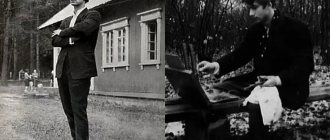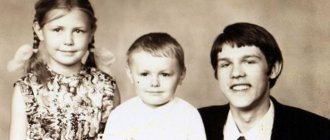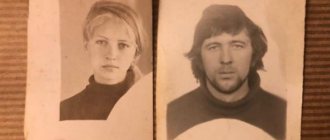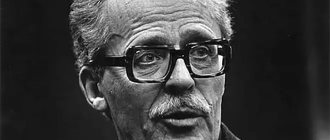“The World in a Horn”: the childhood and youth of the future playwright
Alexander Galich. Photo: svoboda.org
Alexander Ginzburg was born on October 19, 1918. When the boy was two years old, the family moved from Yekaterinoslav (today Dnepr, Dnepropetrovsk region, Ukraine) to Sevastopol, and three years later to Moscow. While still a schoolboy, Alexander Ginzburg wrote his first poem, “The World in a Horn,” which was published in the newspaper Pionerskaya Pravda.
In 1933, Alexander Ginzburg graduated from ninth grade. He could not decide whether to become a writer or an artist, and therefore he immediately entered the Literary Institute and the Opera and Drama Studio of Konstantin Stanislavsky. Then for a whole year Ginzburg ran from play rehearsals to poetry seminars. As a result, he left the Literary Institute: the stage attracted him more, but he did not stop writing poetry.
In 1939, Alexander Ginzburg also left the Opera and Drama Studio. By that time, Konstantin Stanislavsky had died, and the young man did not want to study with other teachers. He entered the theater studio of Alexei Arbuzov and Valentin Pluchek. The studio's first performance was based on the play "City at Dawn", co-authored by Alexander Ginzburg. He played the Komsomol organizer of the Borshchagovsky construction site and wrote songs for the production - this was his debut in drama.
The second performance of the Arbuzov Theater was supposed to be the play “Duel” by Alexander Ginzburg, Isai Kuznetsov and Vsevolod Bagritsky. But the premiere did not take place: the Great Patriotic War began. Alexander Ginzburg did not go to the front due to health reasons. He went to the North Caucasus. First he stopped in Grozny, where he worked for several months in the drama theater and performed in hospitals with his songs. Then he moved to the city of Chirchik near Tashkent, where most of the actors of the Arbuzov theater came.
In 1942, the Arbuzov Theater returned to Moscow. The actors began rehearsing the play “Immortal”, where Alexander Ginzburg played the main role - conservatory student Slavin. The actor also played in the plays “Night of Errors” and “The Guy from Our Town.” During the war, Ginzburg composed poems and songs, comedies and short plays. At the end of 1942, his collection “Boys and Girls” of eight poems about the cruelty of war was published.
Death
After moving to another country, Alexander settles down his life with his wife. However, their idyll in the new place did not last long. The tragedy that happened to the poet was apparently destined by fate.
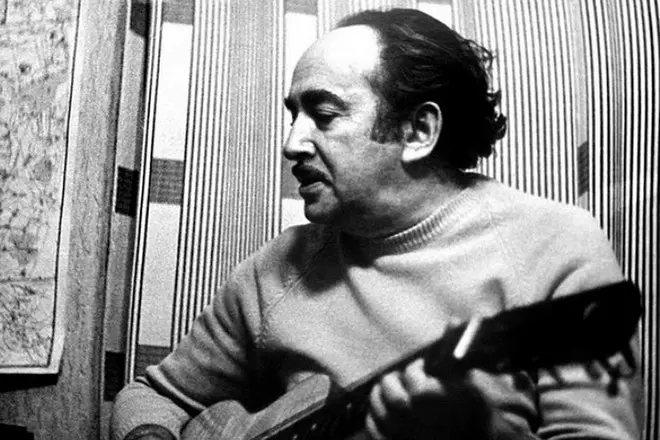
Alexander Galich
One day, Galich’s wife went shopping, and at that time the man decided to connect the antenna to the TV himself. As a result of an electric shock, the man died on December 15, 1977. The cause of death was an electrical discharge that Galich received due to improper handling of electrical equipment.
When his wife found him in the apartment, he was still alive, but since the doctors took a long time to get to the scene of the tragedy, they could not save Alexander. For some time there were rumors that the poet did not die by accident, but that his murder was prepared and planned in advance. However, this version has not been confirmed, and everyone who was at the scene of Galich’s death also claims an accident.
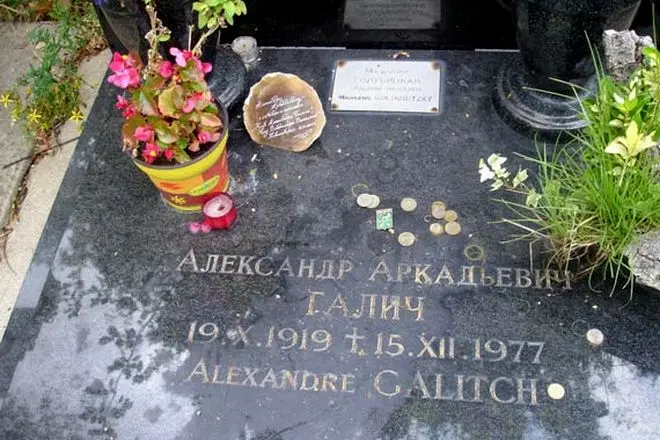
Grave of Alexander Galich
The funeral of Alexander Arkadyevich took place 7 days after his death. The poet's grave is located in Paris, in the Russian cemetery.
An interesting fact is that the ban on the publication of the poet’s books and songs was lifted in 1980. Apparently, recognizing Alexander Arkadyevich’s talent, in 1993 the country’s authorities decided to posthumously return the man’s citizenship.
“From good-natured humor to the sharpest satirical denunciation”: plays by Alexander Ginzburg
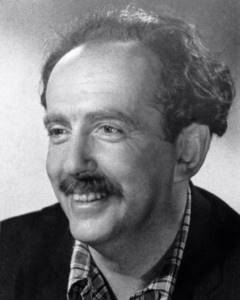
Alexander Galich. Photo: rferl.org
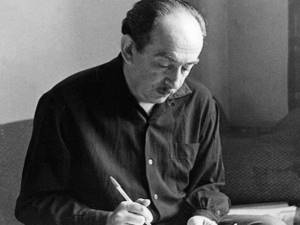
Alexander Galich. Photo: rferl.org
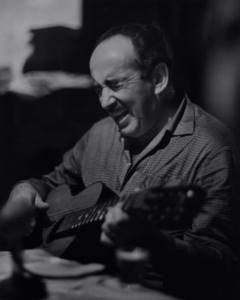
Alexander Galich. Photo: rferl.org
In 1944, the Arbuzov Theater collapsed. Alexander Ginzburg had no means of livelihood left, so he began to write even more. He worked on the plays “Northern Tale” for the Ermolovsky Theater, “I Can Do Miracles” for the Moscow Youth Theater, and “Boys Street” for the Central Children's Theater. But they were in no hurry to install them. As a result, three fairy tale plays by Ginzburg were completely banned by censors.
After the war, Alexander Ginzburg decided to enter the Higher Diplomatic School at the People's Commissariat of Foreign Affairs, but he was not accepted there: the “fifth count” had its effect. In response to the oppression, the writer created the play “Sailor’s Silence.” The author borrowed the name from the famous prison, and in the work he ironized the Soviet order of those years. This work was scrapped: of course, he was not allowed to stage an anti-communist play.
In 1946, Ginzburg wrote a dramatic poem in three acts, “The Beginning of the Path.” The idea for the plot arose after Vasily Grossman’s article “Treblinsky Hell” about German concentration camps. Ginzburg decided to highlight this topic in the theater. The play did not pass censorship for a long time: the writer changed the title to “March, or An Hour Before Dawn,” removed some fragments and even rewrote the ending. However, at that time the performance of it was staged only once - in 1947, at the Leningrad New Theater. Only ten years later, on the 40th anniversary of the October Revolution, the play was published as a separate book and staged in many theaters across the country.
In 1946, Alexander Ginzburg took the pseudonym “Galich”, which was made up of the letters of the surname Ginzburg (“G”), the first name Alexander (“al”) and the patronymic Arkadyevich (“ich”). Under this name, he created the play “Taimyr is calling you” in collaboration with playwright Konstantin Isaev. In 1948, the work was staged at the Leningrad State Comedy Theater, the Moscow State Academic Theater of Satire and the Moscow Drama Theater.
The play soon became popular: it was performed throughout the country and even abroad. Actor Rostislav Plyatt explained the public’s interest by the fact that “the viewer craves the funny in art in all its forms - from good-natured humor to the sharpest satirical denunciation.” Although the official press spoke negatively about the performance.
Galich continued to face censorship. Many of his scripts and plays were rejected. In 1949, the Moscow Satire Theater staged the play “Regulation Obliges” based on the work of Galich and Georgy Munblit. But soon the play was removed and they demanded that it be rewritten in accordance with the “requirements of the era.” As a result of the alterations, its content has changed almost completely.
After a series of devastating articles and failures in cinema and theater, Galich decided to create a script that would definitely pass censorship. Based on the story “The Steppe Sun” by Pyotr Pavlenko, the writer created a film script about the everyday work of young pioneers on a collective farm. In 1951, the film was released under the title “In the Steppe.”
In 1954, after the death of Joseph Stalin, director Nikolai Akimov staged Alexander Galich’s play “Under a Lucky Star” at the Leningrad Lensovet Theater. In the same year, the comedy film “True Friends” was released based on the script by Galich and Isaev “On the Raft”.
The film became very popular. Critic Vladimir Pimenov wrote: “Comrade. Galich is the author of plays and scripts that are widely popular and loved by audiences. He wrote the popular play “Taimyr is calling you,” the play “Under a Lucky Star,” as well as the script “True Friends,” which was successfully screened in cinemas across the country.”
Personal life
Galich met his future wife Valentina Arkhangelskaya in Tashkent. The woman was an actress. Her older brother Rostislav Arkhangelsky is a conductor and composer. The young people dated for some time, and after moving to Moscow they decided to legalize the relationship. And almost immediately after the wedding they began to think about children, so a year later Valentina gave birth to her husband’s daughter Alexandra. However, the poet's personal life was not always happy.
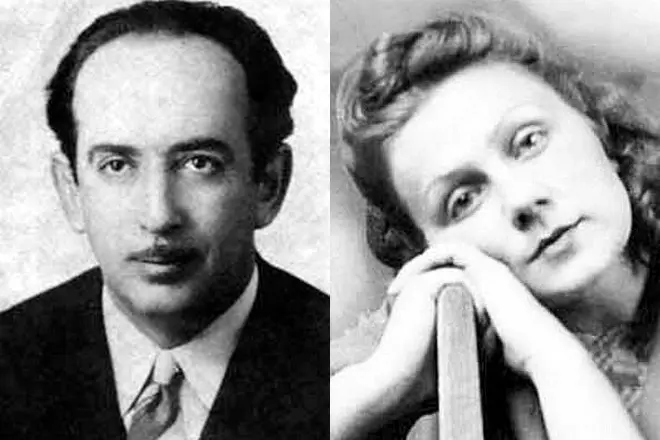
Alexander Galich and Valentina Arkhangelskaya
2 years after the birth of their joint child, Valentina decides to move to Irkutsk, as she receives a position as a leading artist at the local drama theater. Long-distance relationships are difficult for young people, and over time this leads to divorce.
Alexander Arkadyevich did not suffer from loneliness for long and in 1947 he remarried. This time the poet’s chosen one was Angelina Nikolaevna Shekrot. Despite her husband’s infidelities, the woman was with him until death, waited for him at home and loved him to the last.
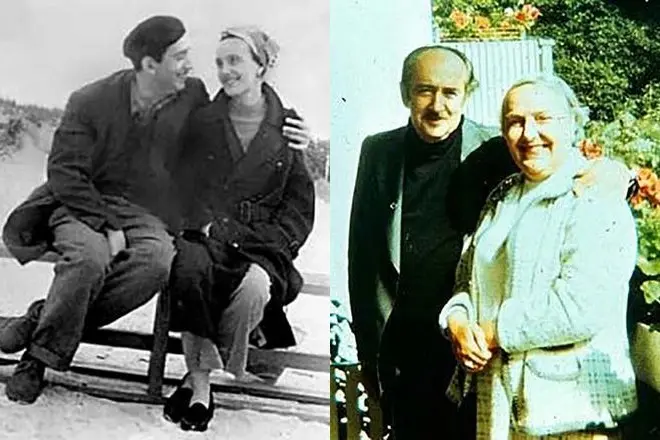
Alexander Galich and his wife Angelina
In 1967, information appeared in the press about the birth of Galich’s illegitimate son. He was born to Sofya Mikhnova-Voitenko, who worked at the Gorky film studio. The boy was named Grisha and registered in his mother's surname.
The last years of his life were tense for Alexander Galich. Infringing on his rights as an author and performer of songs, blocking the path to further career development, government authorities contributed to the man immigrating from the USSR in 1974.
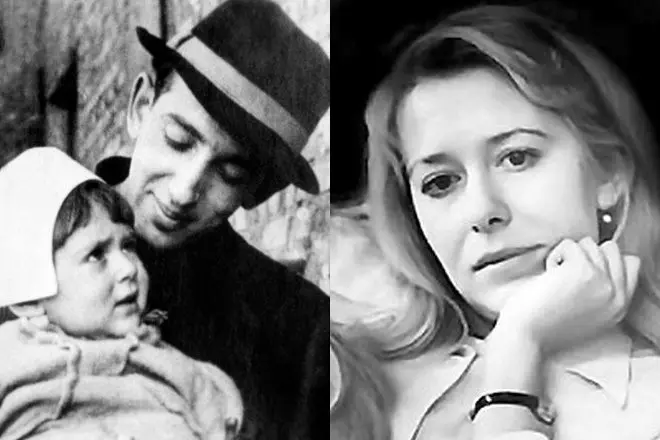
Alexander Galich and his daughter Alexandra
Moreover, the sources of those years voiced two versions of how he did it. Some say it was on an Israeli visa, while others claim that the emigration took place under the guise of going to a Norwegian seminar. 4 months after this, all the works of Alexander Arkadyevich - books, songs, poems and plays - were banned in the USSR and the man was deprived of citizenship.
After leaving the Soviet Union, Alexander Arkadyevich settled in Norway. There he released his first vinyl record, “A Whispered Cry,” with 12 tracks. On the cover of the record there is a photo of the author holding a guitar. Later, Galich moved to Munich, and then, for permanent residence, chose Paris.
↑ Works of Alexander Galich
There is still a common opinion about the song lyrics of Galich’s younger contemporary, Vladimir Vysotsky, that they play without guitar accompaniment. But few of the bards of the first “call” even played the guitar tolerably well. Rather, it reinforced and intensified the impression of the poems. Galich is a professional poet, who also had a good musical education. Only he made the melody deliberately primitive, and also often used ready-made melodies.
His singing is not artistic, it is rather melodic recitation. The main semantic load, of course, rested on the text. Galich's poetic heritage is small, but almost everything he wrote is poetry of the highest standard. The thematic palette is also rich – protest songs, lament songs, the “Literary Bridges” cycle, everyday or genre songs. The language is colorful, in which one can hear echoes of the poetry of the “Silver Age”, then camp shades, then the elements of the street, then the Moscow dialect.
There is no point in exaggerating the popularity of Galich’s songs - he was received with a bang by the capital’s Soviet intelligentsia, greedy for everything forbidden and spicy, but the average person knew little. In this sense, Galich and Vysotsky are antipodes. People invariably received Tagansky Hamlet with enthusiasm. Galich was forced to give preference to “apartment dwellers” and a narrow circle of like-minded people, people initiated into the themes of his songs.


